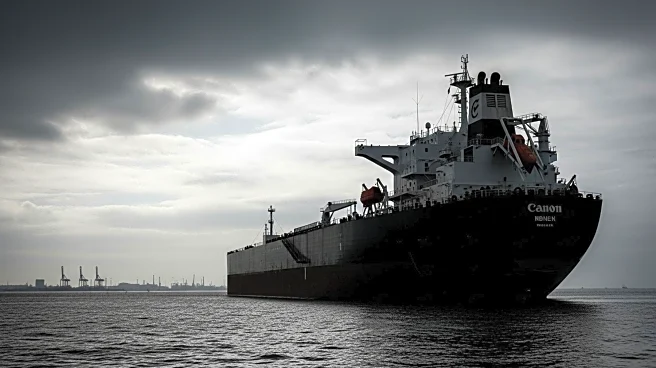What's Happening?
French President Emmanuel Macron announced that an oil tanker, immobilized off the French Atlantic coast, has been linked to Russia's shadow fleet and accused of committing 'very serious wrongdoings.' The tanker, known as 'Pushpa' or 'Boracay,' was sailing under the flag of Benin and is suspected of being part of a fleet that helps Russia evade Western sanctions. French naval forces boarded the ship at the request of prosecutors who suspected illegal activities, including the crew's refusal to cooperate and failure to justify the vessel's nationality. The ship, which left the Russian oil terminal in Primorsk, has been ordered to remain in place pending further investigation. This incident is part of a broader issue with the shadow fleet, which has been a concern in the Baltic Sea region.
Why It's Important?
The detention of the tanker highlights ongoing international efforts to enforce sanctions against Russia amid its war in Ukraine. The shadow fleet, consisting of aging tankers often owned by opaque entities, plays a crucial role in circumventing sanctions, thus financing a significant portion of Russia's war efforts. This incident underscores the challenges faced by European nations in monitoring and controlling illicit activities that undermine sanctions. The actions taken by French authorities could set a precedent for other countries to follow, potentially tightening the enforcement of sanctions and impacting Russia's ability to sustain its economic activities.
What's Next?
Further investigations are expected to determine the full extent of the tanker's activities and its connections to the shadow fleet. Legal proceedings against the crew may follow, depending on the findings. The European Union and NATO may increase their monitoring efforts in the Baltic Sea and other regions to prevent similar incidents. Additionally, there could be diplomatic repercussions, as countries involved in the shadow fleet's operations may face increased scrutiny and pressure to comply with international sanctions.
Beyond the Headlines
The incident raises questions about the effectiveness of current sanctions and the need for more robust international cooperation to address the shadow fleet's operations. It also highlights the complexities of global maritime trade, where non-transparent ownership and flagging practices can obscure accountability. The situation may prompt discussions on enhancing maritime security and regulatory frameworks to prevent the exploitation of legal loopholes.








